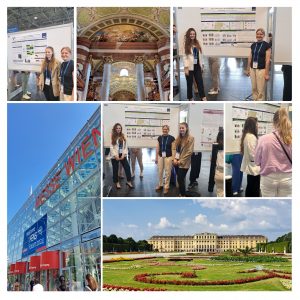 The FENS Forum took place in Vienna from June 25th to 29th, 2024. In addition to interesting lectures, Kirsten and Candy took part in the poster presentation with their own posters. With so many impressions and a lot of work, sightseeing couldn’t be neglected. We are already looking forward to FENS 2026 in Madrid.
The FENS Forum took place in Vienna from June 25th to 29th, 2024. In addition to interesting lectures, Kirsten and Candy took part in the poster presentation with their own posters. With so many impressions and a lot of work, sightseeing couldn’t be neglected. We are already looking forward to FENS 2026 in Madrid.
Hello to a new face
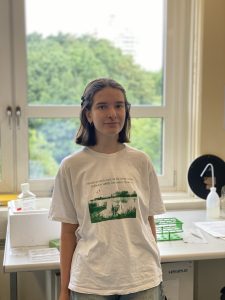 We are pleased to welcome Arina Demidova to our laboratory. She is completing her internship here and would then like to complete her bachelor’s thesis with us. Welcome and looking forward to working with you.
We are pleased to welcome Arina Demidova to our laboratory. She is completing her internship here and would then like to complete her bachelor’s thesis with us. Welcome and looking forward to working with you.
From Master to PhD
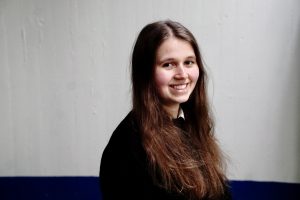 Candy Theis successfully completed her master’s degree and we can now proudly announce that she will remain with us in our laboratory for her doctoral thesis. She will conduct her PhD project as part of the DFG funded research training group MonnDi.
Candy Theis successfully completed her master’s degree and we can now proudly announce that she will remain with us in our laboratory for her doctoral thesis. She will conduct her PhD project as part of the DFG funded research training group MonnDi.
Congratulations on your master’s degree
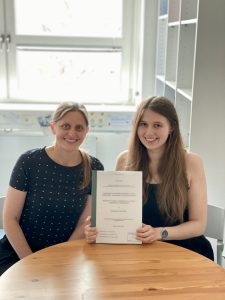 We are very pleased to announce that Candy Theis has successfully completed her master’s degree. The title of her master’s thesis is “Dopamine D1 receptor manipulation in a rat model- Implications for social behavior”. Congratulations from all of us.
We are very pleased to announce that Candy Theis has successfully completed her master’s degree. The title of her master’s thesis is “Dopamine D1 receptor manipulation in a rat model- Implications for social behavior”. Congratulations from all of us.
Full Professorship
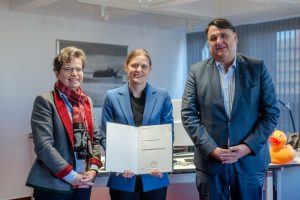
© RUB, Marquard
On January 10th Nadja Freund received her certificate for full professorship. We are very proud and congratulate her very much.
Congratulations
Katharina Janneck successfully completed her bachelor’s degree in our laboratory. She submitted her work in October with the topic: The influence of early life stress on the heart – investigation on the rat model. We wish her all the best for her future.
Welcome Julia
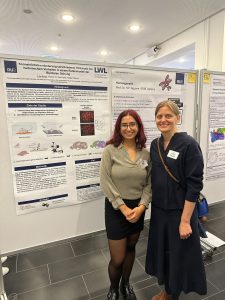 We welcome Julia, who recently joined us for her medical doctoral thesis. Julia’s research focus will be on bipolar disorder. Specifically, she will investigate the connections between different brain regions and their alterations in hedonic behavior in our rat model for bipolar disorder.
We welcome Julia, who recently joined us for her medical doctoral thesis. Julia’s research focus will be on bipolar disorder. Specifically, she will investigate the connections between different brain regions and their alterations in hedonic behavior in our rat model for bipolar disorder.
Congratulations
Kristo finished his master’s thesis in September entitled: 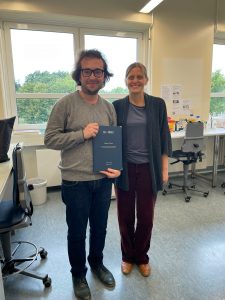 “Poly (I:C) mouse model of schizophrenia: The role of peripheral inflammation”. We congratulate him warmly and wish him all the best for his future.
“Poly (I:C) mouse model of schizophrenia: The role of peripheral inflammation”. We congratulate him warmly and wish him all the best for his future.
Successful DGBS 2023
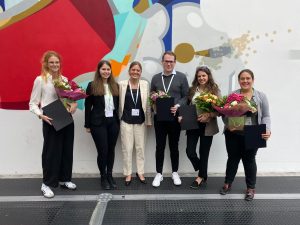 This year’s annual meeting of the German Society for Bipolar Disorders took place from September 14th to 16th in Bielefeld.
This year’s annual meeting of the German Society for Bipolar Disorders took place from September 14th to 16th in Bielefeld.
Members of our working group were also actively participated and e.g. presented posters. We are very proud that Sarah Starosta, Kirsten Schmerder and Patrick Reinhardt won three of the six poster prizes. A nice end to the year for our laboratory. We hope that next year will be as successful as well.
Two Bachelors in one month
 In August we can congratulate twice. Maike Kneist and Monique Jäger successfully completed their bachelor’s degree. Maike’s bachelor’s thesis is entitled “Poly (I:C) animal model of schizophrenia – involvement of the gut-brain axis”. Monique submitted her thesis entitled “Molecular Correlates of Altered Mating Behavior in an Animal Model of Bipolar Disorder”. We wish both of them all the best for their future.
In August we can congratulate twice. Maike Kneist and Monique Jäger successfully completed their bachelor’s degree. Maike’s bachelor’s thesis is entitled “Poly (I:C) animal model of schizophrenia – involvement of the gut-brain axis”. Monique submitted her thesis entitled “Molecular Correlates of Altered Mating Behavior in an Animal Model of Bipolar Disorder”. We wish both of them all the best for their future.
